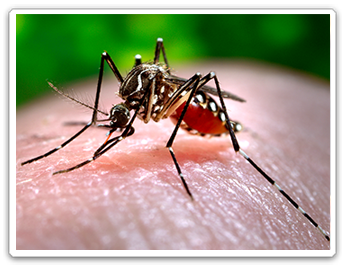Zika Virus
 Zika virus is transmitted primarily by Aedes aegypti (see image) and Aedes albopictus mosquitoes in tropical and sub-tropical regions.
Zika virus is transmitted primarily by Aedes aegypti (see image) and Aedes albopictus mosquitoes in tropical and sub-tropical regions.
Most people do not develop symptoms and for those who do they are typically mild and may include fever, joint pain, rash and conjunctivitis (red eyes). Symptoms usually last from several days to a week. Severe symptoms requiring hospitalization are uncommon and fatalities are rare.
As there is no vaccine or specific treatment for the disease, preventing mosquito bites is critical to avoiding infection.
Image Content Provider: James Gathany US CDC PHIL
Symptoms
Only 20% of infected individuals develop symptoms and these usually appear between 3 – 12 days after the bite of an infected mosquito. Common symptoms may include a low-grade fever, rash, muscle pain, short term joint pain, conjunctivitis (red eyes), eye pain, chills and headache. Less common non-specific symptoms may include weakness, lack of energy, sore throat, diarrhea and nausea/ vomiting. Symptoms are typically mild and last between 2 – 7 days. Severe disease requiring hospitalization is uncommon and deaths are rare. Most people recover fully from Zika virus infection. There is increasing evidence to support the observation that Zika virus infection is associated with neurological complications (i.e. Guillain-Barre syndrome) and birth defects (i.e. microcephaly). Further Zika virus research is continuing.
Causes
Zika virus infection is caused by a flavivirus – related to dengue and West Nile virus. The virus was typically found in Africa and Asia, although outbreaks have been observed in the south Pacific and most recently in the Americas (South & Central America and the Caribbean). It is primarily transmitted from the bite of an infected Aedes mosquito, in particular species such as Aedes aegypti and Aedes albopictus (Asian tiger mosquito) commonly found in tropical and sub-tropical regions. These mosquito species are aggressive biters, who are active during the day and evening hours, highly adapted at living in urban areas and widely distributed throughout the affected regions.
At present only travel-related cases of Zika virus have been documented in Canada. The cool climate in Manitoba and elsewhere in the country has prevented the establishment of these mosquito species, and hence the likelihood of local Zika virus transmission is very low. Presently, it is unknown whether local mosquito species could play a role in Zika virus transmission however, research is ongoing.
Treatment
There is no specific vaccine to prevent, nor medications to treat Zika virus infection. Treatment is focused on relieving symptoms. Consult a physician prior to taking medications, in particular Aspirin, to relieve fever and/ or pain symptoms.
Prevention
Preventing mosquito bites, particularly when the vectors are active, is key to limit the risk of infection with Zika virus. Travelers to regions affected by the current outbreak should use appropriate insect repellents (i.e. those containing DEET and Icaridin), wear protective clothing, use bed nets and make every effort to keep mosquitoes out of living areas by keeping doors closed, window screens in good repair and using air conditioning.
Given the association between Zika virus and the elevated risk of serious health effects on unborn children it is recommended that pregnant women avoid travel to areas where Zika virus is presently circulating, while those attempting to become pregnant who cannot delay travel are encouraged to discuss their risk with their health care provider. In situations where travel cannot be avoided or postponed, individuals are encouraged to adopt strict mosquito prevention measures. Women should avoid becoming pregnant during travel to an area affected by the ongoing Zika virus outbreak, or an area at risk, and for two months after return from said area(s).
Countries and Territories with reports of locally acquired Zika Virus
For a current list of countries with reported locally acquired Zika virus see the Government of Canada’s Zika site.
Manitoba Health Resources
For the Public
- Zika Virus: Public Health Factsheet

(March 24, 2016)
For Health Care Providers
- Health Alert: Zika virus outbreak

(April 1, 2016)
Other Resources
- Government of Canada – Information for Health Care Professionals
- Government of Canada – Rapid Risk Assessment: The Risk of Zika virus to Canadians
- Government of Canada – Laboratory Testing Recommendations for Zika virus
- Government of Canada – Zika Virus Prevention and Treatment Recommendations
- Government of Canada – Zika Virus: Symptoms and Treatment
- Government of Canada – Insect Bite Prevention
- Centers for Disease Control and Prevention – Zika Virus
- Pan American Health Organization – Zika Virus
Information for Travelers
Communicable Disease
Control (CDC) Health Links – Info Santé |


